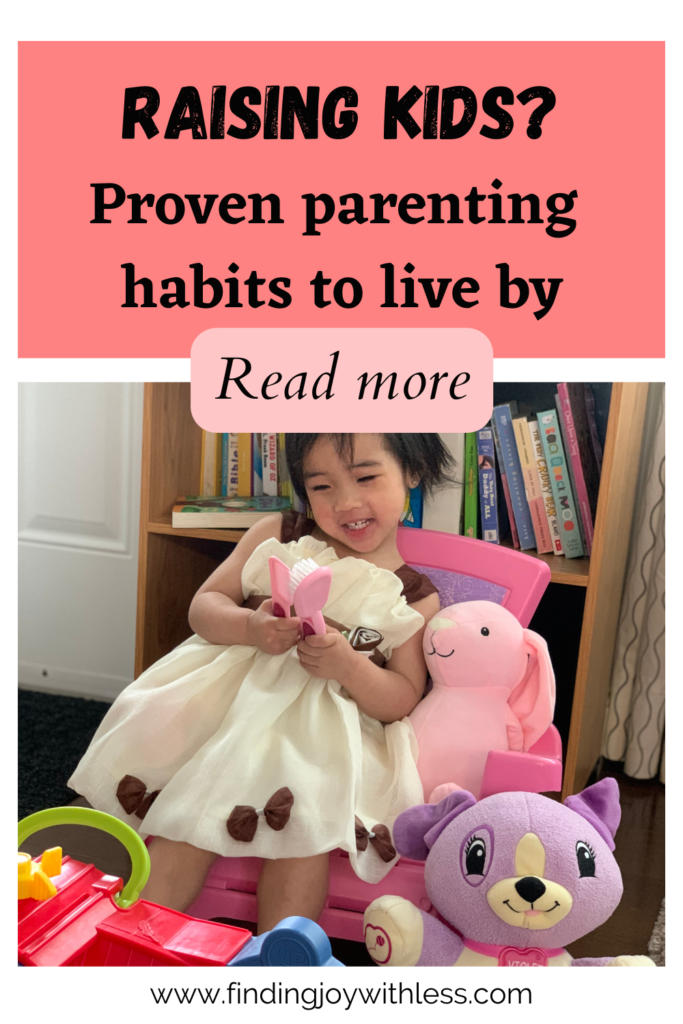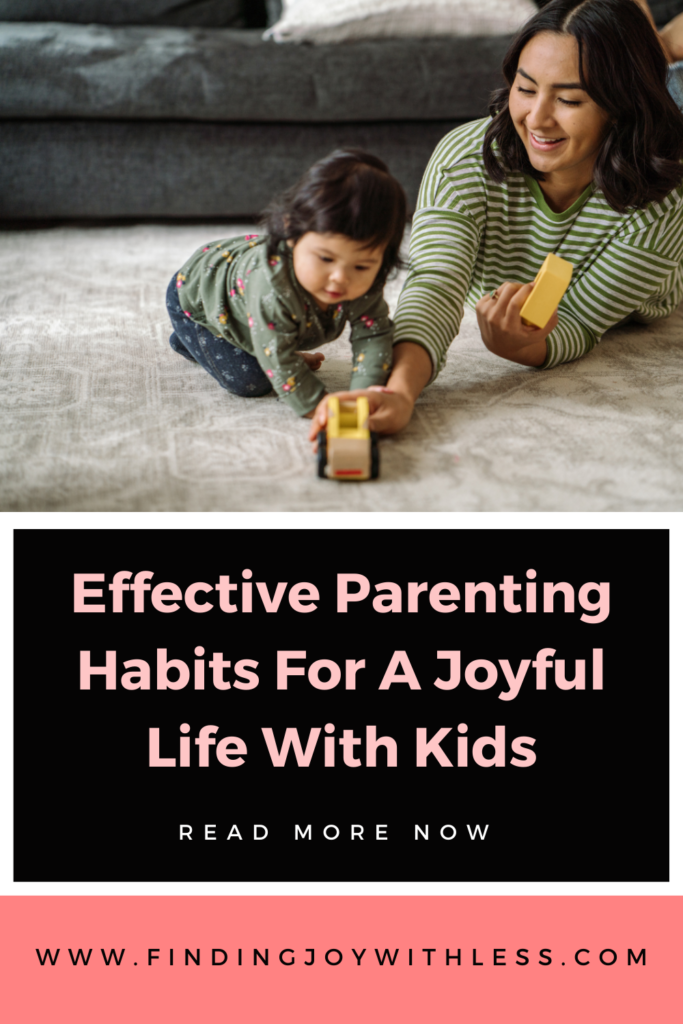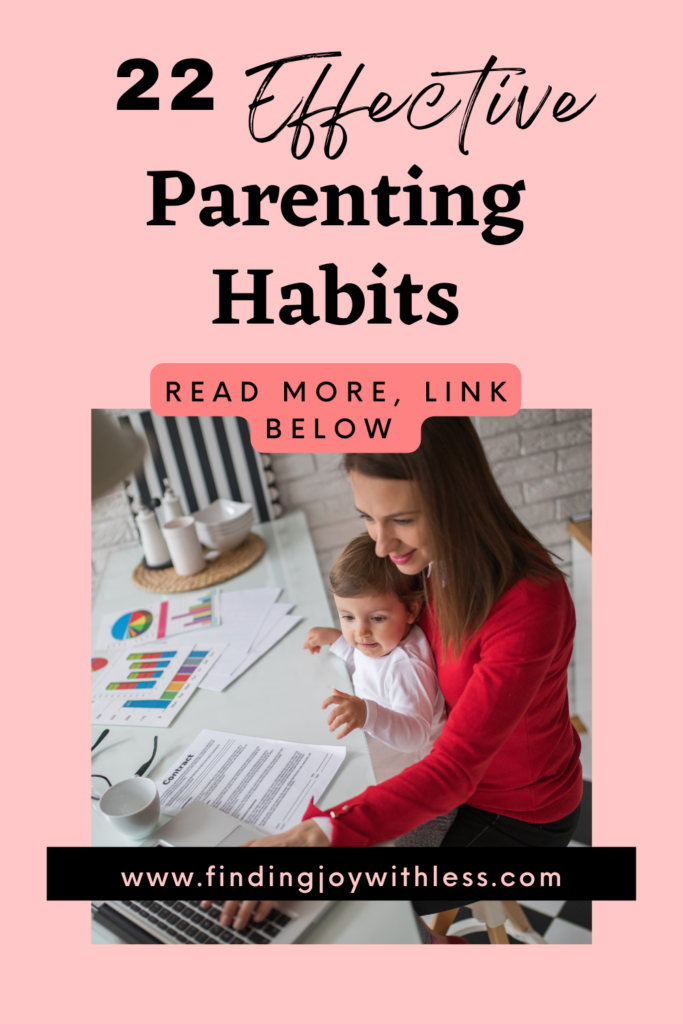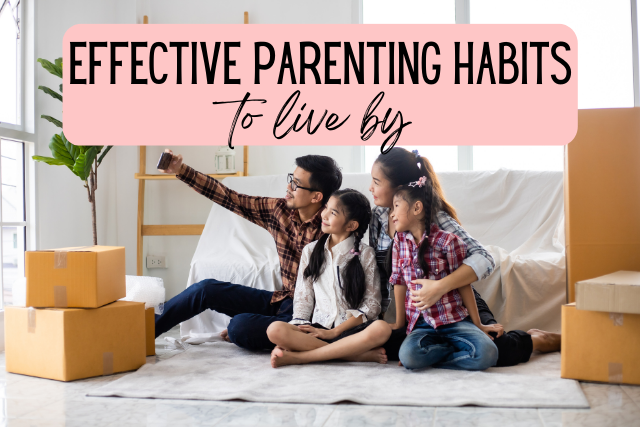Practical, proven parenting habits to find joy in raising children from medically-approved sources and real-life parents
Listen to the episode:
This post may contain affiliate links, which means I’ll receive a commission if you purchase through my links, at no extra cost to you. Please read full disclosure for more information.
Raising children is no easy job. It requires a lot of understanding, patience and using the right parenting habits that will help guide a child in the right direction. As parents, we aim to create an environment where our children can feel safe and secure while growing up. Whether you’ve just started raising kids, have been a parent long enough, or want to be one, this article will help you adopt certain habits that will help you find joy as your kids grow. Though I can’t promise it will be a stress-free ride.
I became a mom at the age of 21, and at that time, I wasn’t even sure how to be a good one. Like other new parents, I wondered why parenting didn’t come with a manual. Thankfully, with my mom being on my side most of the time, I was inspired to accomplish the big assignment as a parent. If she raised five kids independently, I wouldn’t have any issues rearing one.
Wrong! I still had issues, but most of them I could overcome or just learned from and moved on. Because that’s what we do as normal human beings, we take our steps and sometimes fall, but we do our best to get back up and start over. And that’s the best advice I can teach my kids as well. That’s it!
Kidding aside, it takes a lot to raise children and how we are raised also affects how we would handle our own. While I didn’t have a master’s or doctorate in Psychology, I have almost seventeen years of experience being a parent. I hope to share the habits that I believe to be effective for parenting and some from my friends. At the same time, I did research from medically-approved sources to back up these tips, or some might call hacks. Let me break them up into 5 categories.


According to Dr. Randy Schroeder, the author of Simple Habits for Effective Parenting, there are four Rs that we need to remember, and these are Relationships, Routines, Responsibilities, and Rules. We’ll break down each one of them into bite-sized categories.
Build a strong foundation as a parent
Here are six habits to build a strong foundation in your parenting journey:
Have a solid faith and relationship with God.
I used to think I was a super mom when I was a single mom because I could handle raising a child on my own. But the truth is, God placed people in our lives to support us and lead us in the right direction. I’m not going to mention each one who helped me, but I’m sure they all know how grateful I am.
If you have a spouse, learn each other’s strengths and weaknesses in parenting to complement each other.
Related post: How to improve your relationship with your spouse
Be a good role model (KidsHealth.org, n.d.)
Our children have watchful eyes, and they see how we treat people and things. They notice when we lash out at customer service or shop too much. So we must practice the behaviour we want them to see and learn.
When I was younger, I smoked a lot. Yes, my mama didn’t agree, so don’t blame her. I also drank a lot, and these habits didn’t do me any good. My daughter was in the discovery stage, and I thought if she saw me smoking at home, she would surely ask me what I was doing and why. Now, if you do these things, I’m sure you have your reasons, but for me, I didn’t want to have to explain to her why I practice those bad habits because it wouldn’t make sense. That made quitting easier for me.
Teach them your positive cultural traits
I’m glad that my friend, Grace Iguis, pointed this out. In the Philippines, we show signs of respect to our elders by saying “po” or “opo”. We also do not call the elders by their first names. For example, we call our aunts “tita” and our uncles “tito” instead of calling them by their first names. Even though we live in Canada now, I still like to teach my kids the best respectful traits that I learned from my home country. So wherever you are from, please don’t feel weird practicing your values even in a different culture.
Practice self-care.
To be good parents, it is essential that we feel good about ourselves and practice self-care. If we are not healthy, it will be challenging to meet the needs of our children. Self-care can come in many forms. I have a blog post on my website written by my sister, Marjorie Frenette; I highly recommend reading it to remind yourself of its benefits.
Related post: What you need to know about self-care and its essence to your well-being
Know your limitations as a parent. (KidsHealth.org, n.d.)
As parents, it is essential to recognize our limitations. We should know what we cannot do and understand the importance of seeking help. We should also accept that we cannot control everything in our children’s lives and learn to trust their judgment as they grow older.


Establish a solid parent-child relationship
Here are seven habits you can practice to establish a great relationship with your kids:
Read to them.
Reading to your kids is a great way to foster their love of literature and encourage imagination. It also helps build language and vocabulary skills and allows them to connect with you and other family members. Take time each day to read stories together – it’s a beautiful bonding experience that your children will cherish for years to come. I read to Hazel, my toddler, at least 20 minutes a day. I might have read longer to Bianca, but each child has different stages, and you can decide how long this activity will take.
Talk to your child. (Amy Morin, 2021)
Communication is vital in any parent-child relationship, and having a conversation can help build trust and understanding. It is essential to talk to your child regularly. Taking time to talk to your child about their day or asking them how they are feeling can make all the difference in fostering a positive and healthy relationship.
Learn how to listen to your kids.
As a mom, I know it can be challenging not to give advice or provide solutions right away when our kids say their concerns about friends or the school. But just like us, sometimes, we need someone to hear us, which makes all the difference for them. This is something I need to work on with my teenager.
Quality versus quantity.
The quality of time we spend with our children is more important than the amount of time we spend. The best way to ensure you’re spending quality time with your children is to be available. This means being accessible, not just physically but also mentally. Try to make sure you’re free from distractions so you can listen to what your child says and respond accordingly. For example, when we ask them about their day, make sure that you have the time to focus on them instead of asking for the sake of asking. Do you know what I mean? Sometimes we do that, and I’m guilty of this so much that I had to remind myself in this article.
Take breaks.
With the many tasks that need to be completed each day, it can take time to find time for yourself. That’s why it’s essential to take breaks when you need them. You can schedule regular intervals throughout the day to stay sane and able to nurture your kids. My husband and I have this mutual agreement on taking breaks from our kids sometimes. I saw a funny Instagram video before where the mom locked herself in a car, and when the kids asked why she said, “what? I am having my break”. If I find it, I’ll include it in the show notes.
Show love and affection.
My husband and I are affectionate parents. We hug and kiss our kids in the morning, at night, or anytime during the day. When my kids are showing irritable moods, sometimes it takes a quick hug from mommy to change the attitude and resume play.
Another affectionate way of showing love is when we remain calm when communicating with our children. I admire my sister, Elly, for modelling this for my niece, Haylee.
Appreciate your children and praise their effort.
You can encourage your children by appreciating and praising their effort. By recognizing their progress instead of focusing solely on the results, you can provide them with valuable support to build their confidence and drive them to do better. (Alexander & Sandahl, 2016)
As parents, we must encourage a growth mindset for their children to understand the power of effort truly. Instead of saying, “you’re so smart,” when your child succeeds, try emphasizing how much effort they put into achieving success. This will teach them that success comes through dedication and hard work rather than talent alone.


Establish routines for kids.
My friend, Konstantin Purisima, a father of two, said, “Have a routine until it becomes a habit. For example, since I work from home, I prepare breakfast and sometimes lunch during work breaks, so I have plenty of time to take the kids to the playground after work. You can get long naps if you have tired kids.”
My former coworker, Jay, advised reading aloud as part of their nightly bedtime routine.
When you practice the seven habits to build a strong relationship with your kids, you will then incorporate these into your daily or monthly routines. They can help you whenever appropriate with house chores; you can have movie nights or sometimes take out kids on a date separately without breaking the bank. Every Valentine’s day, my eldest looks forward to Harry’s gift to her because we made a tradition between them to make this day extra special for her.
Teach Children Responsibilities
Here are some parenting habits that teach kids about responsibilities:
1. Introduce age-appropriate chores (Jay)
2. Respect their independence in doing certain tasks.
Jackie Louise Allen, a solo parent I know, said she bought an air fryer for her eldest, who only likes to eat fried dishes. He’s then solely responsible for cleaning it up afterwards.
3. Allow them to make choices and teach them to negotiate and compromise.
For smaller kids, you can let them choose what to wear or what to play with at a time.
4. Teach them about finances early on.
I wrote an article about teaching kids financial literacy that will significantly help this matter.
Related post: How to teach Financial Literacy and Money Management to our children
5. Make room for mistakes and keep no record of wrongs. (1 Corinthians 13:5)
This is for both kids and parents. Another piece of advice from my friend Jay is that, as parents, we are not infallible. We should also apologize as soon as we recognize our mistakes.
6. Allow them to learn the consequences of their actions.
Teach the classic “if you do this, then _____ will happen.”
7. Teach them the golden rule of treating others how they want to be treated. (Matthew 7:12)
Establish rules and be flexible when needed
Establishing rules is an effective way to keep order in a household, but being open to change when needed is critical for joyful parenting. As parents, we must be firm, consistent, and flexible in certain situations. When you have a good relationship with your child, they will most likely abide by your rules.
I agree with my friend, Jay. When setting boundaries for children, parents should teach them what behaviours are acceptable and unacceptable. This will help children understand the consequences of their actions, be aware of what’s expected of them, and learn how to make responsible decisions.
Parents should also ensure their expectations are reasonable and achievable to help their kids succeed without feeling overwhelmed or inadequate.
At the same time, it’s essential not to be too rigid with rules, as some situations may require a more relaxed approach.
You can set some limitations when it comes to meal times. Some rules could be like limiting social media or using other electronic devices. My friend, Joy Garcia, in the Philippines, lets her kids choose what to eat for supper as long as they eat what’s on the table for lunch.
Key Takeaways
“But the most important advice I want to give you is to stay involved….our best tool as they enter and move through their adolescent years is our ability to advise and explain and also to be good role models.” (Jensen, Nutt, 2015)
In conclusion, effective habits for joyful parenting can be achieved by having a strong foundation of unconditional love and support. We should strive to make our home the safest and most secure place for our children, regardless of our circumstances. This will help them trust us and know that their parents will always be there to show them kindness and understanding no matter what. Joyful parenting is an ongoing process that requires effort, patience and understanding.
What other parenting habits do you do for your children? Let us know in the comments.
References:
Experts, K. H. M. (Ed.). (n.d.). 9 steps to more effective parenting (for parents) – Nemours kidshealth. KidsHealth. Retrieved January 15, 2023, from https://kidshealth.org/en/parents/nine-steps.html
Amy Morin, L. C. S. W. (2021, July 1). How to raise children that are more responsible and mentally strong. Verywell Family. Retrieved January 15, 2023, from https://www.verywellfamily.com/9-habits-of-highly-effective-parents-4058242
Alexander, J. J., & Sandahl, I. D. (2016). A is for Authenticity. In The danish way of parenting: What the happiest people in the world know about raising confident, capable kids. essay, TarcherPerigee Book.
Jensen, F. E., & Nutt, A. E. (2016). The teenage brain: A neuroscientist’s survival guide to raising adolescents and young adults. Harper.








This is a great read!!
Great discussion. Good habits start early.
Awesome post! Communication, listening & self-care are so key. But really all of them you listed are on point and truly matter.
Thank you for that insightful post and for thr book recommendations. I’m a big believer in encouraging children, and it’s really so important to leave room for mistakes, while raising them in the fear of the Lord.
I appreciate your comment. Glad you liked this post.
Thank you, Morgan.
Great insight! Unconditional love and support are the cornerstone of effective parenting and creating a safe and secure home environment for children is crucial in fostering trust and building a strong bond. It’s so important to remember that joyful parenting is a journey and requires effort, patience, and understanding. Well said!
thank you!
Thanks for sharing!!! The best we can do for our kids is to be there for them, all the time!!!